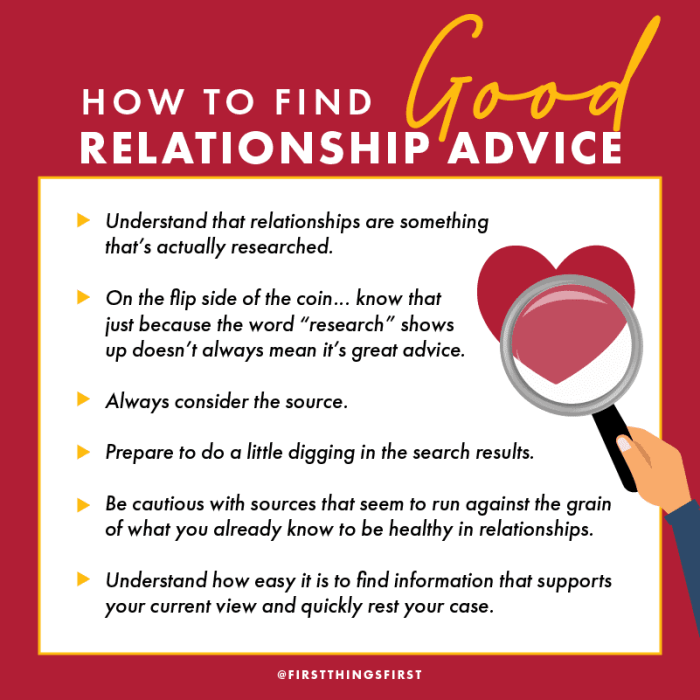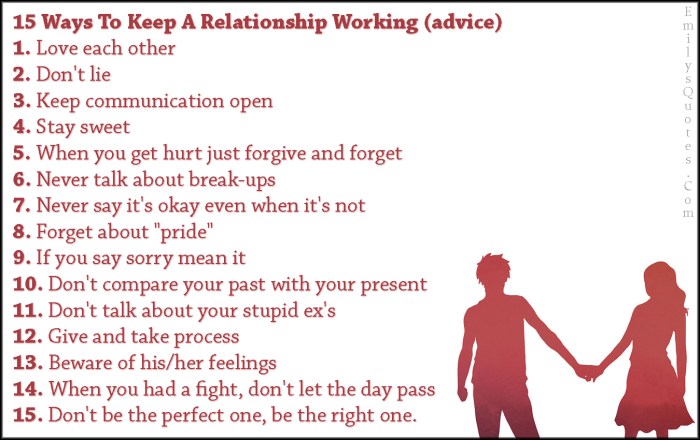Relationship Advice is essential for maintaining healthy connections and navigating the ups and downs of love and partnership. From effective communication to building trust, this guide explores the crucial aspects of relationship advice.
Importance of Relationship Advice
Seeking relationship advice is crucial for maintaining healthy relationships as it provides an outside perspective on issues, helps in identifying areas for improvement, and offers effective strategies to navigate challenges.
Benefits of Receiving Relationship Advice
- Gain insights from a neutral third party who can provide unbiased feedback and suggestions.
- Receive guidance on how to enhance communication skills and foster a deeper connection with your partner.
- Learn effective conflict resolution techniques to address disagreements in a constructive manner.
How Relationship Advice Can Help in Resolving Conflicts and Improving Communication
- Encourages open and honest conversations to express thoughts and feelings without fear of judgment.
- Teaches active listening techniques to understand your partner’s perspective and respond empathetically.
- Provides tools to manage emotions during disagreements and find common ground to reach mutually beneficial solutions.
Types of Relationship Advice

Relationship advice can come from various sources, each with its unique perspective and approach. It’s essential to understand the differences between professional advice and advice from friends or family members, as well as the value of self-help resources in providing guidance for relationships.
Professional Relationship Advice
Professional relationship advice is typically provided by counselors, therapists, or relationship experts who have formal training and experience in dealing with interpersonal issues. They offer a structured and objective approach to addressing relationship challenges, using evidence-based techniques to help couples navigate their problems effectively.
Advice from Friends or Family Members
Advice from friends or family members is often well-intentioned but may be biased or based on personal experiences rather than professional expertise. While their support and insights can be valuable, it’s essential to consider the source and context of the advice before applying it to your own relationship.
Self-Help Resources
Self-help resources, such as books, online platforms, and workshops, can provide valuable relationship advice by offering practical tips, exercises, and tools for couples to improve their communication, resolve conflicts, and strengthen their bond. These resources empower individuals to take an active role in nurturing their relationships and seeking personal growth.
Effective Communication in Relationships: Relationship Advice

Effective communication plays a crucial role in building strong and healthy relationships. It is the foundation on which trust, understanding, and intimacy are built. Without effective communication, misunderstandings can arise, conflicts can escalate, and relationships can suffer. Here are some tips on how to improve communication with your partner:
Active Listening
- Practice active listening by giving your partner your full attention when they are speaking.
- Avoid interrupting and try to understand their perspective before responding.
- Paraphrase what your partner said to ensure you understood correctly.
Open and Honest Communication
- Be open and honest about your thoughts, feelings, and needs with your partner.
- Avoid bottling up emotions or sugar-coating the truth to prevent misunderstandings.
- Express yourself clearly and directly without resorting to passive-aggressive behavior.
Respectful Communication, Relationship Advice
- Communicate with respect, even when discussing difficult topics or disagreements.
- Avoid name-calling, yelling, or using hurtful language that can damage the relationship.
- Listen to your partner’s point of view without judgment and show empathy.
Effective communication can prevent misunderstandings and conflicts by fostering a deeper connection and mutual understanding between partners. By actively listening, being open and honest, and communicating respectfully, you can strengthen your relationship and overcome challenges together.
Trust and Honesty in Relationships
Building trust and maintaining honesty are crucial components of a healthy and successful relationship. Trust forms the foundation of a strong bond between partners, while honesty fosters open communication and transparency.
Ways to Build Trust and Maintain Honesty with Your Partner
- Communicate openly: Share your thoughts, feelings, and concerns with your partner to establish a sense of transparency and vulnerability.
- Be reliable: Follow through on your promises and commitments to show that you can be trusted to keep your word.
- Show empathy: Demonstrate understanding and compassion towards your partner’s emotions and experiences to build a deeper connection.
- Be consistent: Act in a way that aligns with your values and principles to build credibility and trustworthiness.
Impact of Lack of Trust or Honesty on a Relationship
- Breakdown in communication: Without trust and honesty, partners may struggle to communicate effectively, leading to misunderstandings and conflicts.
- Emotional distance: Lack of trust can create a sense of insecurity and distance between partners, hindering emotional intimacy.
- Jealousy and suspicion: When trust is lacking, jealousy and suspicion can arise, causing further strain on the relationship.
- Deterioration of the relationship: Ultimately, a lack of trust and honesty can erode the foundation of a relationship, leading to its eventual breakdown.
